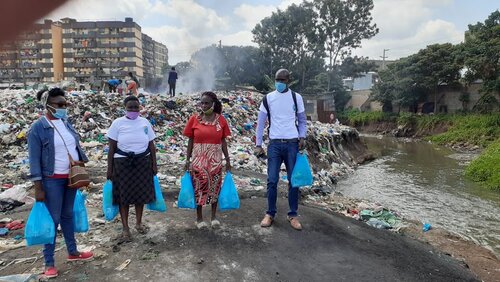UHC2030 is excited to welcome several new and distinguished...
26 January 2021
Updates from the CSEM in 2020

Even as the COVID-19 pandemic disrupted lives across the world, civil society continued the critical push for universal health coverage (UHC). The Civil Society Engagement Mechanism for UHC2030 (CSEM) remained active through activities and publications in 2020, especially to ensure that ‘leave no one behind’ is at the center of the global response to the pandemic. The Advisory Group and members have been working at the country, regional, and global levels to continue to link health systems strengthening for UHC to pandemic response and preparedness.
Follow-up from the High-Level Meeting on UHC
The CSEM has continued to engage in advocacy to hold leaders accountable for commitments made at the UN High-Level Meeting on UHC in 2019. In addition to country work by partners, the CSEM hosted post HLM webinars (EN, FR, SP) and participated in the Ministerial Meeting on UHC: One Year Commemoration of the High-Level Meeting on UHC. The CSEM supported the State of UHC Commitment Report (see: synthesis report, country profiles) by ensuring civil society voices are well-represented in the stocktaking of UHC commitments; CSEM disseminated the multi-stakeholder survey through our networks and hosted country consultations with civil society representatives in the US, Vietnam and Kazakhstan.
Civil Society Participation in the COVID-19 Response
CSEM with the Social Participation Technical Network (SPTN) conducted a Civil Society Participation in the COVID-19 Response survey in April that received over 200 responses from 58 countries. in Africa, Asia, North America, and Latin America and the Caribbean. The vast majority of respondents reported there was little or no involvement of civil society in national COVID-19 responses. Through various consultations with civil society members over months, the CSEM published Civil Society’s COVID-19 Calls to Action (EN, FR, SP) as a living document that aims to reflect common points that can support advocacy efforts for an equitable COVID-19 response and recovery. The CSEM and Communities at the Heart of UHC Campaign also hosted a virtual forum on the role of community health workers in the COVID-19 pandemic; more than 170 people registered to view this discussion.
Most recently, the CSEM and Equal International developed a civil society intervention to a decision framework released by the WHO and the OECD for social and movement policy measures during the COVID-19 pandemic. The paper, ‘The health and economic impacts of Covid-19 containment strategies on the most left behind: Recommendations for how we can build back better, strong and more resilient health and economic systems,’ presents civil society’s perspectives and critical experiences of government responses to the COVID-19 pandemic with specific considerations on populations who are most at risk and marginalized.
Other recent publications from CSEM emphasized how civil society can be better engaged in the COVID-19 response and health systems strengthening. These include:
- Governance of COVID-19 Response: A Call for More Inclusive Transparent Decision Making (BMJ Global Health)
- COVID-19: A Test for Political Leaders to Truly Leave No One Behind (UN DESA)
- For an Equitable COVID-19 Response, Investments in Civil Society Cannot Wait (UHC2030 Blog)
- Stories from Civil Society on Protecting Everyone (CSEM feature for UHC Day)
Global leadership on civil society engagement and citizen-led social accountability for UHC
In May, the CSEM with the Global Health Council, Action for Global Health UK, RESULTS UK, and WACI Health co-organized a townhall meeting with the WHO Director-General Dr Tedros Adhanom Ghebreyesus to relay recommendations from civil society to increase opportunities for engagement with the WHO throughout the COVID-19 crisis. In response, the WHO Secretariat hosted a town hall with Dr Tedros in July focused on civil society engagement in the COVID-19 response at national and local levels and committed to beginning a dialogue series. The CSEM with a small group of civil society representatives gathered as a Working Group to call for and review proposals on topics to discuss for the remainder of the meeting series and co-hosted one on social participation and accountability. See: Summary of civil society dialogues
In addition, the CSEM with UHC2030 contributed to the WHO social participation handbook, which aims to provide practical guidance to governments, by hosting consultations with civil society actors and participated in the launch event. See: Webinar
The CSEM Advisory Group and Secretariat also participated in a number of conferences and forums throughout the year in support of inclusive and equitable policies and programs for health. These included:
- IAP 2020 Report Launch
- GAP Progress Report Launch
- Thai National Assembly
- Global Initiatives for Children’s Surgery
- Prince Mahidol Award Conference (PMAC)
- Global Forum on Childhood Pneumonia
- African Regional Forum on Sustainable Development
- High Level Political Forum 2020
- UCLG and UHC2030 High-Level Policy Dialogue
- HSR2020 Symposium: All Together – Stronger Health Systems for UHC and Health Security
- International AIDS Conference: COVID-19 Mitigation Approached for HIV, TB, Viral Hepatitis and STIs
- NCD Accelerator Training 2020
- WHA 73 side session: ‘The Role of Community Health Workers in Achieving UHC: What COVID-19 Taught Us’
- UNGA Side Sessions
In 2021, the CSEM will continue efforts for a COVID-19 response and recovery that leaves no one behind and contributes to the progress towards UHC. Through collaborative online and offline activities by our diverse group of members and a representative Advisory Group that will welcome a few new members this year, we will strengthen participatory and inclusive governance and decision-making to achieve health for all.
To learn more and find updated content in English, French and Spanish, visit csemonline.net. If you are a civil society representative advancing health, financing or governance agendas that relate to achieving UHC, join us.
Photo: Ugenya Youth and Community Development Project delivering food and other supplies in Nairobi, Kenya. Credit: Ugenya Youth and Community Development Project
